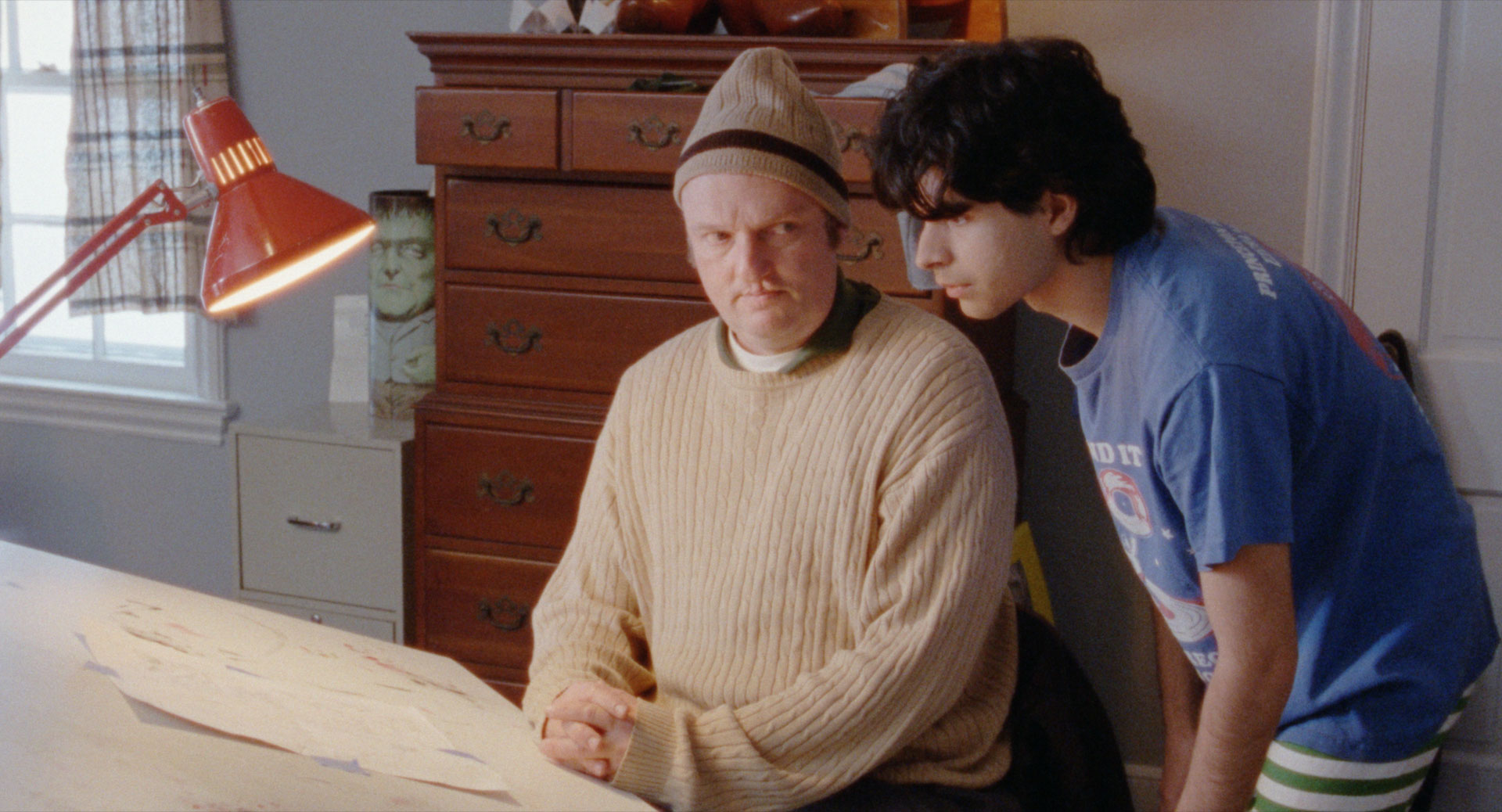There are pluses and minuses to bringing a brash new vision to filmmaking. On the plus side, you might give viewers something they’ve never seen before. On the minus side, they could be just as likely to question whether they really want to watch it. In writer-director Owen Kline’s modest, assertively offbeat feature debut Funny Pages, a precocious teenage cartoonist drops out of high school to focus on his drawing, to which he’s obsessively dedicated. He moves out of his parents’ super-cushy Princeton, New Jersey, home and into a highly peculiar roommate situation in a disheveled Trenton basement. The movie’s humor is Pixy Stix-dry; there’s little that’s cute or endearing about either the film overall or Kline’s main character, Robert (Daniel Zolghadri)—and that’s a plus. Yet Funny Pages still feels slight and only vaguely shaped. Well-observed details are great, but they’ll only take you so far.
At least Robert isn’t your run-of-the-mill disaffected kid. Bright and ambitious, he radiates deep disdain for art that he thinks is beneath him: he has zero interest in superhero comics, instead deriving inspiration and joy from 1970s-era underground comics, the outrageously crude yet brilliant Tijuana bibles of the 1930s, and even the stuff of 20th-century childhoods, like Dick Tracy and Scrooge McDuck. His best friend, Miles (Miles Emanuel), a lanky, shy, acne-ridden kid who radiates gentle sweetness, shares Robert’s enthusiasms, and may also be a little bit in love with him.
But Robert seems to be outgrowing everything around him, including Miles’ friendship. The one adult he respects, his art teacher Mr. Katano (Stephen Adly Guirgis), dies very early in the movie, shuffling off this mortal coil in a classic black-comedy setup. Robert has nothing but contempt for his parents (Josh Pais and Maria Dizzia), seeing them as bourgeois and controlling even though it’s clear they’ve given him everything. (In the movie’s most crushing scene, Robert unwraps a comic-related box set his mother has carefully chosen for him as a Christmas gift and remarks that it’s useless to him because he has all the originals; the look on her face tells you both how much she loves this kid and how much it hurts her that he’s turned into such a pain in the ass.) The one adult who seems to understand him is Cheryl (played by the wonderful character actor Marcia DeBonis), a public defender who takes on his case when he gets into a minor scrape with the law, despite the fact his parents have hired a fancy lawyer.

Kicking away from everything that’s comfortable and safe, and ignoring his parents’ entreaties to stay in school, Robert strikes out on his own, working part-time at his favorite comic-book store and also doing some office work for Cheryl. It’s in her office that he meets Wallace (Matthew Maher), a loose-cannon oddball who, Robert learns, used to work as an assistant colorist at one of the comic-book publishers he reveres. Wallace is one of those guys who can barely keep it together, but Robert is dazzled by him, building him up to be a role model in ways the poor man can never fulfill. Robert’s understanding of Wallace’s reality is warped, and he doesn’t have such a great grasp on his own, either. Kline is perceptive enough to show us that if Robert is headed for a fall, he has no one to blame but himself.
And yet, Kline may still be a little too sympathetic to his hapless, callow hero. Zolghadri plays Robert as a know-it-all naif, but beneath his cockiness we can still see cracks of insecurity. It’s easy to feel something for him—he clearly has no idea what he’s doing—but he does begin to wear out his welcome as a character. At one point Robert’s father, having reached the end of his fuse, appends some choice expletives to his assessment of his son’s rebellion: “You’re a spoiled brat, and that’s all that this is.” It’s the movie’s hallelujah moment. Kline also isn’t sure where to put the camera, how to move it or where to let it linger. At one point Robert cruelly takes Miles to task for his acne, lecturing him about the greasy food he insists on eating. Kline’s camera lingers long and close on Miles’ mottled cheek, as if to make sure we get the point.
Read more reviews by Stephanie Zacharek
You could argue that Kline is striving to capture the ultimate reality. But there’s also something to be said for using discretion and a little kindness in how you present your characters. Kline has a gift for eccentric comic touches—there’s a great sight gag involving an aquarium fish who’s gone AWOL—and an awareness of how youthful passions can either blossom into genius or merely create unbearable gasbags whose heads are filled with trivia of questionable value. But how you’re communicating matters just as much as what you’re saying. At one point Miles asks, pleadingly, “Is form really more important than soul?” It isn’t. But creating a shape for your ideas never hurts—it’s like building a little house for the soul to live in. And that goes for movies, too.
More Must-Reads from TIME
- L.A. Fires Show Reality of 1.5°C of Warming
- Home Losses From L.A. Fires Hasten ‘An Uninsurable Future’
- The Women Refusing to Participate in Trump’s Economy
- Bad Bunny On Heartbreak and New Album
- How to Dress Warmly for Cold Weather
- We’re Lucky to Have Been Alive in the Age of David Lynch
- The Motivational Trick That Makes You Exercise Harder
- Column: No One Won The War in Gaza
Contact us at letters@time.com